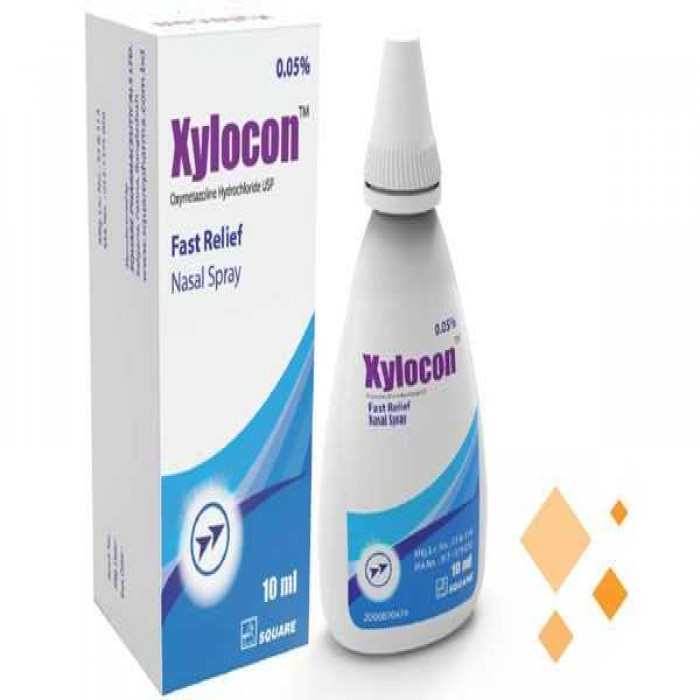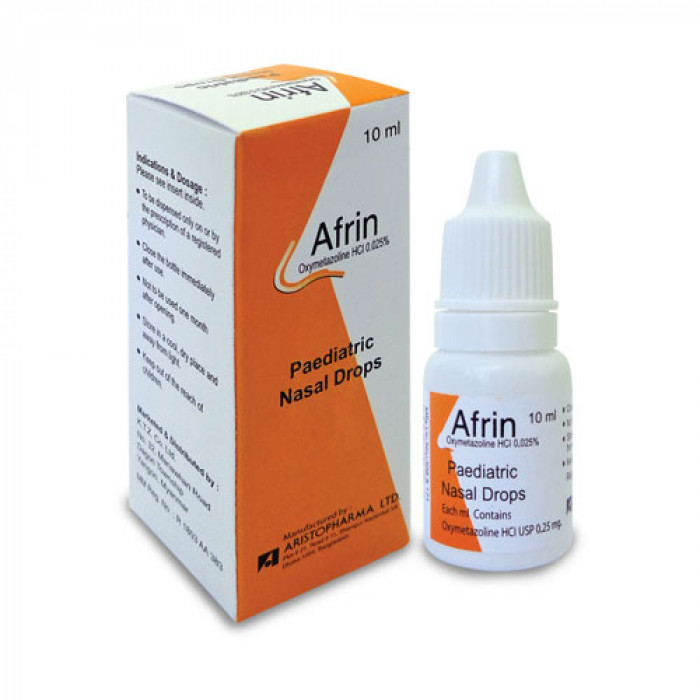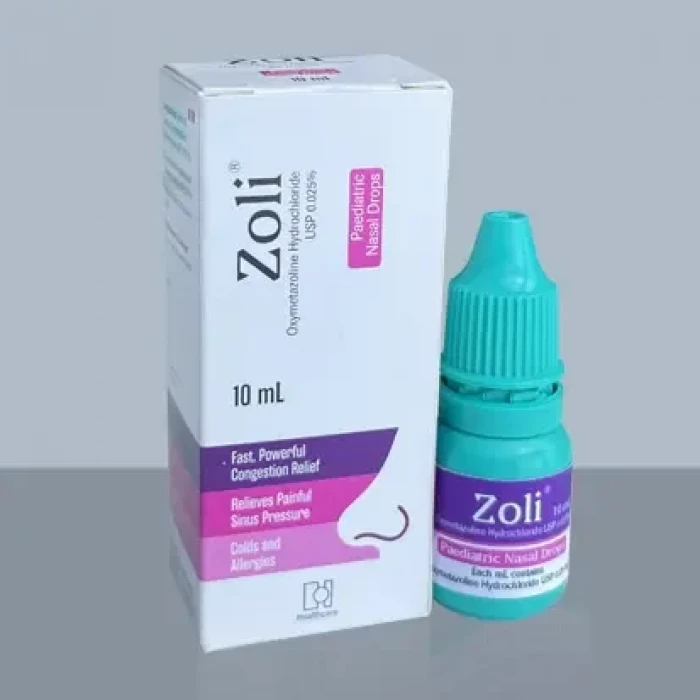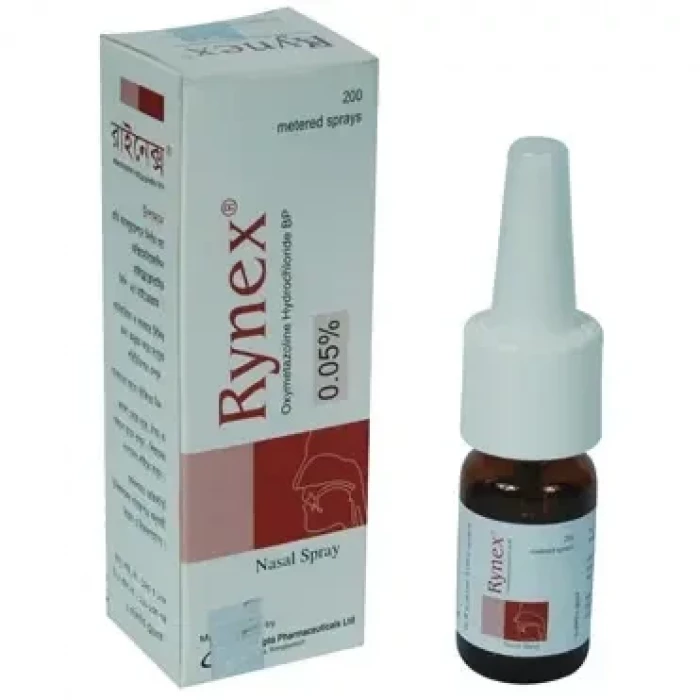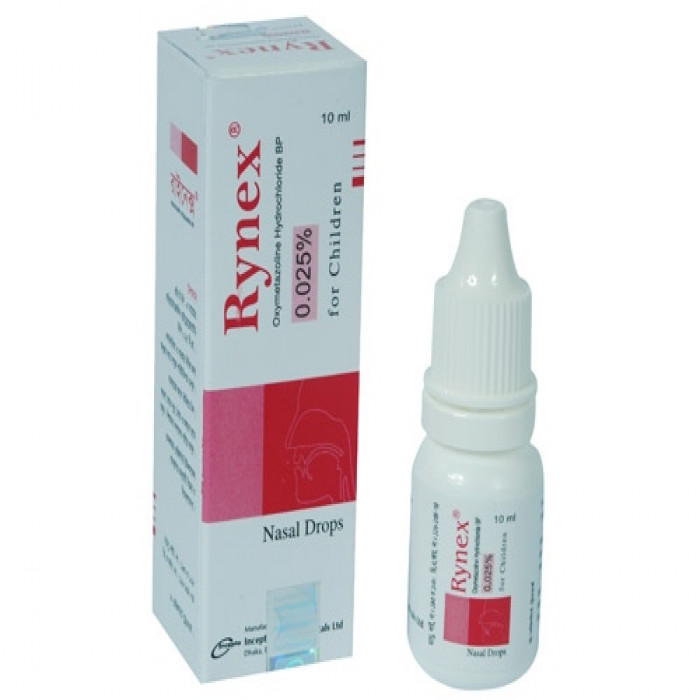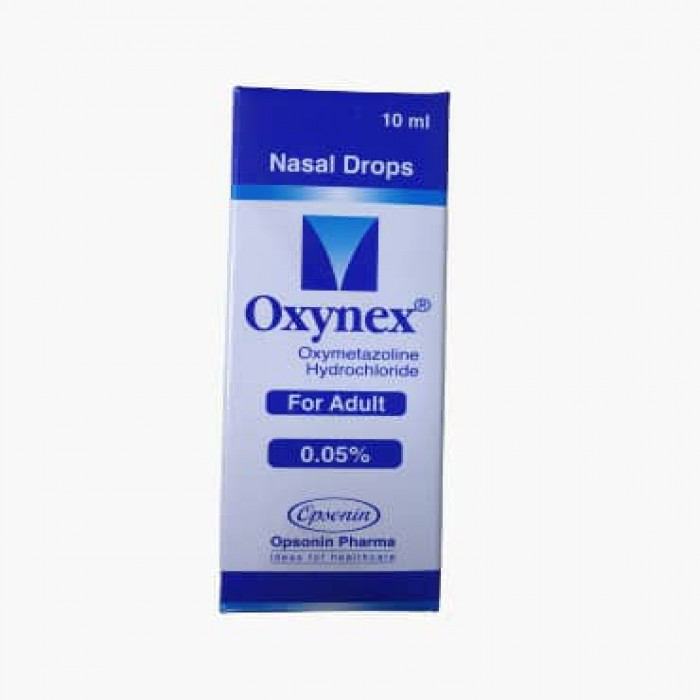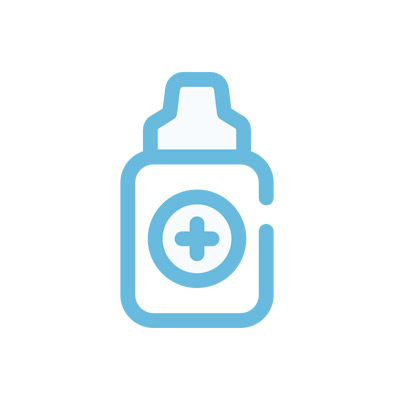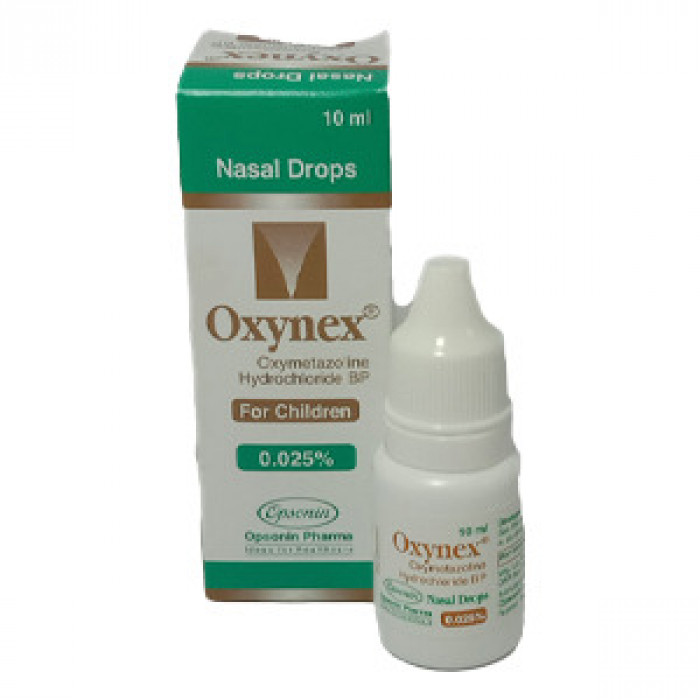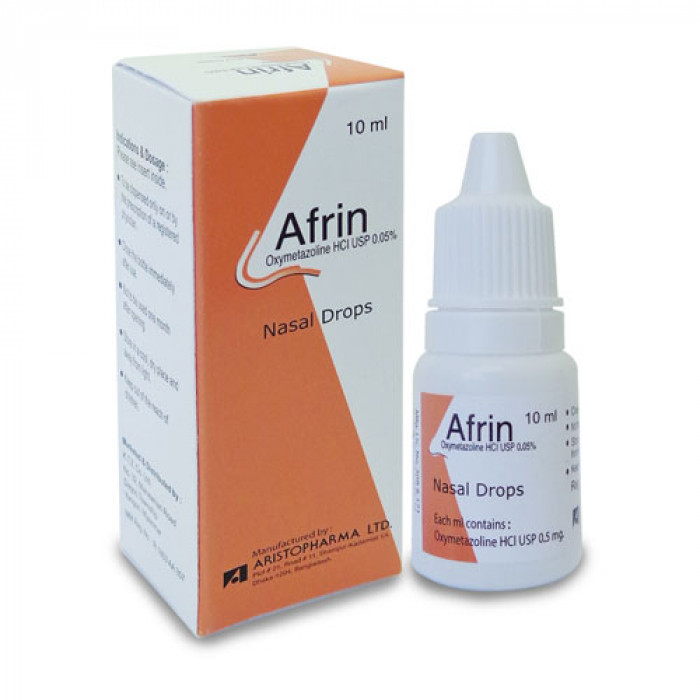Due to National Election, orders may be processed slight delay, nationwide.
Leading Online Pharmacy of Bangladesh
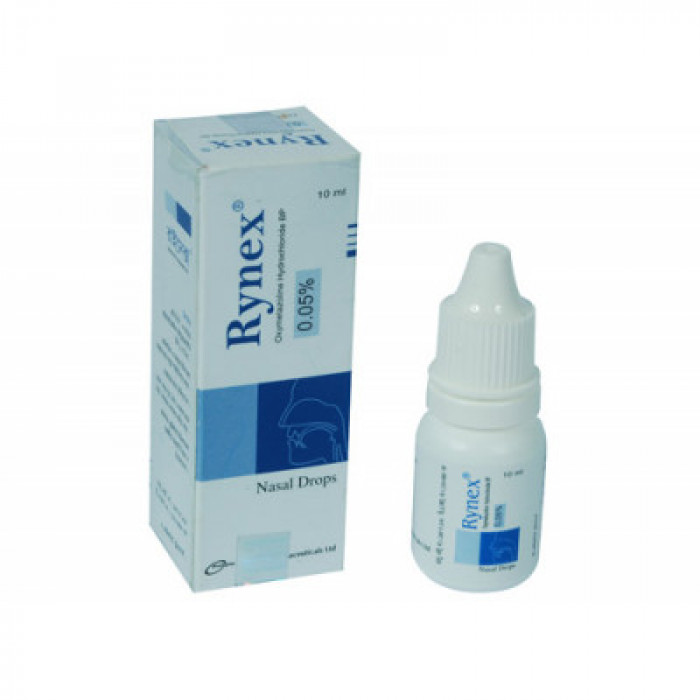
✔ 100% Authentic Product
👁️ Currently Viewing 4802
Rynex 0.05% Nasal Drops
Oxymetazoline Hydrochloride is a nasal decongestant that provides relief from nasal discomfort caused by conditions like hay fever, sinusitis, allergies, and the common cold. It can also temporarily reduce eye redness when used as an ophthalmic agent. However, it is not recommended for children under 6 years old unless specifically instructed by a doctor.
Discount
Price: ৳ 43
MRP:
৳
45
5%
Off

100% Genuine Products, Guaranteed

Safe & Secure Payments, Always

Fast, Secure & Efficient Delivery

Proper Packaging
 Cash on Delivery - All over Bangladesh
Cash on Delivery - All over Bangladesh Regular Delivery - 12-24 Hours, Dhaka City* Charge Tk.39-59
Regular Delivery - 12-24 Hours, Dhaka City* Charge Tk.39-59 Regular Delivery - 24-48 Hours, Other Cities* Charge Tk.99-110
Regular Delivery - 24-48 Hours, Other Cities* Charge Tk.99-110
 ফ্রি ডেলিভারিঃ - ৯৯৯ টাকা+ অর্ডারে, ঢাকা
শহরে
ফ্রি ডেলিভারিঃ - ৯৯৯ টাকা+ অর্ডারে, ঢাকা
শহরে ফ্রি ডেলিভারিঃ - ২৯৯৯ টাকা+ অর্ডারে, ঢাকার
বাহিরে
ফ্রি ডেলিভারিঃ - ২৯৯৯ টাকা+ অর্ডারে, ঢাকার
বাহিরে
100% Genuine Products, Guaranteed
Safe & Secure Payments, Always
Fast, Secure & Efficient Delivery
Proper Packaging
 Cash on Delivery - All over Bangladesh
Cash on Delivery - All over Bangladesh Regular Delivery - 12-24 Hours, Dhaka City* Charge Tk.39-59
Regular Delivery - 12-24 Hours, Dhaka City* Charge Tk.39-59 Regular Delivery - 24-48 Hours, Other Cities* Charge Tk.99-110
Regular Delivery - 24-48 Hours, Other Cities* Charge Tk.99-110 ফ্রি ডেলিভারিঃ - ৯৯৯ টাকা+ অর্ডারে, ঢাকা
শহরে
ফ্রি ডেলিভারিঃ - ৯৯৯ টাকা+ অর্ডারে, ঢাকা
শহরে ফ্রি ডেলিভারিঃ - ২৯৯৯ টাকা+ অর্ডারে, ঢাকার
বাহিরে
ফ্রি ডেলিভারিঃ - ২৯৯৯ টাকা+ অর্ডারে, ঢাকার
বাহিরে
✅ Description:
- Rynex 0.05% Nasal Drops is a medication specifically designed to alleviate nasal congestion, which is commonly caused by conditions such as the common cold, flu, hay fever, and allergies. Narrowing the blood vessels in the nose effectively relieves congestion and blockage.
- It is important to use Rynex 0.05% Nasal Drops as prescribed by your doctor. Typically, it is recommended to gently blow your nose before applying the drops. Close one nostril while administering the medication into the other nostril, then take a deep sniff to ensure that it reaches deep into the nasal passages. Repeat the process for the other nostril. The relief provided by Rynex 0.05% Nasal Drop is usually fast-acting and can last for several hours. However, it is important to note that this medication offers only temporary relief, and it should not be used more frequently or for a longer duration than advised by your doctor. Overuse may potentially worsen your symptoms instead of improving them.
- The most commonly reported side effects of Rynex 0.05% Nasal Drops include mild nose irritation and dryness of the mouth or throat. If these side effects cause discomfort or persist, your doctor may be able to suggest methods to prevent or reduce them.
- In general, Rynex 0.05% Nasal Drops is considered a safe medication. However, it is essential to discuss any existing health conditions with your doctor before using it. This includes conditions such as heart problems, high blood pressure (hypertension), an overactive thyroid gland, glaucoma (increased eye pressure), or prostate enlargement. Additionally, inform your doctor about any other medications you are currently taking to ensure your safety. If you are pregnant or breastfeeding, it is advisable to consult your doctor for advice before using this medication.
- Always rely on the guidance and recommendations of your doctor or healthcare provider to ensure the appropriate and safe use of Rynex 0.05% Nasal Drops.
Safety Advices

Alcohol
UNSAFE
Interaction with alcohol is unknown. It is advisable to consult your doctor before consumption.

Pregnancy
CONSULT YOUR DOCTOR
Rynex 0.05% Nasal Drops is not recommended for use in pregnant women unless necessary. Discuss all the risks and benefits with the doctor before taking this medicine.

Breastfeeding
CONSULT YOUR DOCTOR
Rynex 0.05% Nasal Drops is not recommended for use in breastfeeding women unless necessary. Discuss all the risks and benefits with the doctor before taking this medicine.

Driving
No interaction found/established

Kidney
No interaction found/established

Liver
No interaction found/established
✔️ Uses of Rynex 0.05% Nasal Drops
For decongesting blocked or stuffed noses.
✔️ How does Rynex 0.05% Nasal Drops work?
Oxymetazoline acts by reducing the swelling of the blood vessels in the nose and eyes. This helps in decreasing the discomfort and redness caused by the dilated blood vessels.
✔️ Side Effects of Rynex 0.05% Nasal Drops
- Increased heartbeat
- Increased blood pressure
- Nausea
- Dryness of eyes
- Headache
- Irritation
- Dryness in mouth
- Dry throat
✔️ Quick Suggestions:
- Rynex 0.05% Nasal Drops work right away and each dose provides relief for up to 12 hours.
- Avoid deep breathing as it will cause the medication to go back to the throat and make it less effective.
- Do not share the bottle with anyone else so that you do not spread germs.
- Rynex 0.05% Nasal Drops can make nasal congestion worse if used for more than 3 or 4 days in a row (called rebound congestion).
✔️ Indication
Oxymetazoline hydrochloride is a medication commonly used to relieve nasal congestion associated with various conditions. It is particularly effective in treating acute or chronic rhinitis, the common cold, sinusitis, upper respiratory allergies, epistaxis (nosebleeds), and hay fever. Additionally, it is used as a nasal decongestant in the treatment of otitis media (middle ear inflammation).
✔️ Pharmacology
Oxymetazoline Hydrochloride is a sympathomimetic amine that is an imidazoline derivative. It acts as a direct agonist on -adrenoceptors but has no effect on -adrenoceptors. When applied topically to the nasal mucosa, it causes a fast and long-acting vasoconstriction of the arterioles, lowering blood flow and decreasing mucosal edema. This improves the potency of the airway and the drainage of the nasal sinuses.
✔️ Dosage & Administration of Rynex 0.05% Nasal Drops
- For adults and children 6 years of age and older, the recommended dosage of oxymetazoline nasal drops is 2-3 drops of 0.05% concentration in each nostril. This should be administered twice daily, in the morning and evening.
- For children aged 2-5 years, the recommended dosage is 2-3 drops of 0.025% concentration in each nostril. This should also be administered twice daily, in the morning and evening.
It is important to follow the specific dosage instructions provided by your healthcare professional or as stated on the medication packaging. If you have any questions or concerns regarding the appropriate dosage for you or your child, it is advisable to consult with your healthcare provider or pharmacist for guidance.
Remember to administer the drops as directed, ensuring they reach deep into the nostrils, and avoid exceeding the recommended dosage or frequency of use. If symptoms persist or worsen despite using the medication, it is recommended to seek further medical advice.
✔️ Interaction
Oxymetazoline nasal preparations should not be used by patients who are currently using or have recently discontinued the use of MAO inhibitors. MAO inhibitors are a type of medication used to treat depression and other mental health conditions. Concurrent use of oxymetazoline nasal preparations and MAO inhibitors can lead to a potentially serious condition known as hypertensive crisis, which is characterized by a severe increase in blood pressure.
It is important for individuals who are considering using oxymetazoline nasal preparations to inform their healthcare provider about all medications they are currently taking, including any MAO inhibitors, to avoid potential drug interactions and adverse effects. If you have recently used MAO inhibitors or are unsure about their use, it is best to consult with your healthcare provider before using oxymetazoline nasal preparations. They can provide you with personalized advice and guidance based on your specific medical history and current medication regimen.
✔️ Contraindications
Oxymetazoline nasal preparations are not recommended for individuals with certain medical conditions, including:
- Cardiovascular illness: Oxymetazoline can constrict blood vessels, which may potentially worsen cardiovascular conditions such as high blood pressure, heart disease, or atherosclerosis. It is important to consult with a healthcare provider before using oxymetazoline nasal preparations if you have any cardiovascular conditions.
- Hyperthyroidism: Oxymetazoline may affect thyroid function and can potentially worsen symptoms in individuals with hyperthyroidism, a condition characterized by an overactive thyroid gland. It is advisable to discuss the use of oxymetazoline nasal preparations with a healthcare provider if you have hyperthyroidism.
- Prostatic enlargement: Oxymetazoline can cause urinary retention or difficulty urinating in individuals with prostatic enlargement, also known as benign prostatic hyperplasia (BPH). It is recommended to consult with a healthcare provider before using oxymetazoline nasal preparations if you have BPH.
- Angle-closure glaucoma: Oxymetazoline can increase the intraocular pressure in the eyes, which can be harmful to individuals with angle-closure glaucoma, a condition characterized by increased pressure in the eye. It is important to inform your healthcare provider about this condition before using oxymetazoline nasal preparations.
- Allergy to components: If you have a known allergy to oxymetazoline or any other components of the nasal preparation, it is advisable to avoid using it to prevent allergic reactions.
✔️ Pregnancy & Lactation
The safety of using Oxymetazoline Hydrochloride Nasal Drops during pregnancy and breastfeeding is not fully established. While there is limited data available on the use of oxymetazoline nasal drops in pregnant and breastfeeding individuals, it is generally considered to have a low risk.
Pregnancy: It is advisable to consult with a healthcare provider before using oxymetazoline nasal drops during pregnancy. The potential risks and benefits should be carefully evaluated based on the individual circumstances. In general, nasal decongestants like oxymetazoline are used for short durations and in recommended doses during pregnancy to minimize any potential risks.
Breastfeeding: It is recommended to consult with a healthcare provider before using oxymetazoline nasal drops while breastfeeding. Limited data suggest that the amount of oxymetazoline that passes into breast milk is minimal, and it is unlikely to cause significant harm to the nursing infant. However, caution is still advised, and it is important to use the medication as directed and at the lowest effective dose.
In both cases, the decision to use oxymetazoline nasal drops should be made in consultation with a healthcare provider who can assess the potential risks and benefits based on the individual's medical history and current health status.
✔️ Precautions & Warnings
Prolonged use of oxymetazoline nasal drops can lead to rebound congestion, where the nasal passages become more congested after the effects of the medication wear off. This can result in a cycle of dependency on the nasal drops and worsening congestion.
Additionally, oxymetazoline can have systemic effects on the body, meaning it can affect other parts of the body beyond the nasal passages. This is why caution is advised in individuals with hypertension (high blood pressure), cardiovascular disease, hyperthyroidism (overactive thyroid), or those taking MAO inhibitors (a type of medication used to treat depression).
To minimize the risk of rebound congestion and systemic effects, it is generally recommended to use oxymetazoline nasal drops for a short duration, usually no longer than seven days, unless otherwise directed by a healthcare professional. Using it for longer periods or more frequently than recommended can lead to tolerance, dependence, and worsening congestion.
✔️ Storage Conditions
- Close the cap tightly after use
Do not use it if the seal is broken - Store at room temperature.
- Keep it away from children and pets.
⚠️Disclaimer:
At ePharma, we’re committed to providing accurate and accessible health information. However, all content is intended for informational purposes only and should not replace medical advice from a qualified physician. Please consult your healthcare provider for personalized guidance. We aim to support, not substitute, the doctor-patient relationship.




